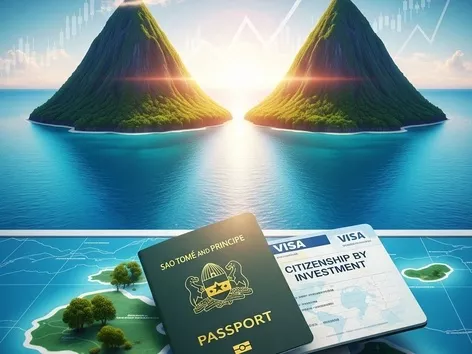Non-CRS countries that guarantee banking privacy

More than 120 countries have already become members of the Common Reporting Standard (CRS) system. Therefore, it is becoming increasingly difficult to legally protect your financial position from prying eyes. Learn more about how to legally diversify your finances in non-CRS jurisdictions in 2025
The OECD's Common Reporting Standard (CRS) requires banks to provide tax authorities with information about client accounts to combat tax evasion.
This international initiative stops hidden offshore accounts by forcing banks to confirm where their clients' taxes are paid. Despite the intrusiveness of CRS, it promotes compliance with the law. The main goal is to legally diversify wealth, not to hide funds offshore.
What is the Common Reporting Standard?
The CRS (Common Reporting Standard) system allows countries to exchange financial information with each other to effectively monitor the taxation activities of their citizens. This approach makes it impossible for so-called “undisclosed” bank accounts to exist, which were once discussed in connection with Swiss banks and other popular financial centers in the world.
The main idea behind the CRS is that banks should automatically collect financial data about their clients and send it to the tax authorities of the country where these clients are tax residents. The goal is to reduce tax evasion and maintain the integrity of tax systems.
More than 120 countries have already joined the CRS system, including most important financial centers. Banks now have the right to request information from clients about their tax residency, and this has become standard practice.
However, not all countries have joined the CRS. Many of them are places with a dubious reputation where not everyone would want to open a bank account. However, some highly developed countries have not yet implemented this system due to internal reasons or traditions of banking secrecy.
How to legally avoid CRS
The Foreign Account Tax Compliance Act (FATCA) has become a significant part of the global financial landscape, especially for US citizens and resident aliens. FATCA requires international banks to provide information about U.S. account holders to the U.S. government and the Internal Revenue Service (IRS). Even if a country is not a signatory to the CRS, it may be bound by FATCA.
As a U.S. citizen, you are required to file an annual FBAR and possibly Form 8938. This means that you must report all of your foreign accounts. Also, residents of some countries must report their foreign bank accounts, even if the information is not automatically exchanged.
One of the main differences between a UK citizen and a US citizen is that a UK citizen can declare themselves non-resident in their home country and move to a country where no reporting is required without having to renounce their citizenship. On the other hand, a US citizen must renounce his or her citizenship if he or she wants to avoid tax liabilities.
Opening an offshore bank account is legal for most people, including US citizens. However, some governments may prohibit their citizens from opening bank accounts in other countries, so it is important to always check this information.
Who can benefit from Non-CRS policies?
Such banking havens provide opportunities for legal organization of assets. However, you should check the tax laws of your country before using them:
1. US citizens remain obliged to report foreign accounts through FBAR and FATCA, even in jurisdictions that are not low-tax countries;
2. Other developed countries also often require their citizens to self-report offshore accounts and income;
3. For perpetual travelers looking for lifestyle flexibility and financial privacy, there are some countries outside the CRS. However, their use requires professional advice to ensure compliance with all requirements;
4. Wealthy entrepreneurs can use non-CRS jurisdictions for diversification and tax optimization, but only if their financial transactions are properly structured.
Before opening offshore accounts or considering alternative jurisdictions, it is important to get qualified advice to ensure proper compliance with all requirements and avoid tax problems in the future.
Countries that have not joined the CRS
The OECD also counts more than 40 developing countries that have not yet joined the CRS. Along with 206 sovereign countries and other non-sovereign territories, there are a number of jurisdictions that are not on any of the lists.
Cambodia
Cambodia is developing rapidly as an economic player, despite its frontier status. Unlike other Asian countries, such as Myanmar, which have not lived up to high expectations, Cambodia's economy has been in a state of steady growth since the 1990s, attracting significant investment, including capital from local and international banks.
Many Malaysian and Western banks are present in Cambodia. Local banks offer some of the highest interest rates in US dollars, making them attractive to depositors. However, opening a bank account in Cambodia may require a business visa or other visa confirmation to ensure legal residence status.
Dominican Republic
Many Canadian and American expats choose the Dominican Republic as their place of residence. Some of them even obtain permanent residence, which often requires a deposit in local banks. The Dominican Republic is famous for its decent banking sector.
There are numerous banks and savings institutions in the country, most of which are locally owned and offer a wide range of financial services. One of the players in the local market is Scotiabank, a large Canadian bank that continues to actively expand its presence in the region.
For expats who choose the Dominican Republic, access to local banks allows for convenient financial management and ensures reliability and stability. Whether it is opening a bank account, investing or obtaining loans, the Dominican Republic's banking system offers a variety of services to meet the needs of its clients.
Guatemala
Guatemala is often not considered as one of the main countries for expats in Central America, but it has been attracting attention for a long time. Its neighbor Belize often receives more attention, but this situation can quickly change.
Local Guatemalan banks, such as Agromercantil and Azteca Bank, are present in the market and play a dominant role. It is also worth noting the presence of banks such as Citi. However, it is not recommended to transfer all your money to Guatemala City, the main reason being that the banks hold significant government bonds.
North Macedonia
North Macedonia is one of the most business-friendly countries in the Balkans and Europe, thanks to its low single tax rates and incentives for entrepreneurship.
It is also one of the countries that has not joined the CRS system, which may be attractive to those looking for alternative locations for financial management. Although the banking system in North Macedonia has not reached the level of sophistication of some other countries in the region, it is constantly improving. In addition to local banks operating in the country, there are large European banks such as Societe Generale, Erste Group and ProCredit Bank.
Philippines
The Philippines remains a popular country among expats due to the ease of opening bank accounts. The country's island network has a large number of international banks, as well as strong local financial institutions offering very attractive interest rates.
According to the experience of many expats, the banking system in Manila does not always comply with CRS standards even if they are implemented. However, it is important to note that the Philippines has friendly relations with the United States, so the country's banks comply with FATCA requirements.
Large international banks such as HSBC are popular in the Philippines, but for most expats, it is recommended to go to lesser-known local banks, such as Metrobank. These banks often provide better service and conditions for foreign clients, providing reliable banking services in accordance with international standards.
United States
It is interesting to note that the country that was the first to implement the unilateral exchange of banking information through FATCA has not joined the CRS system itself. The OECD and the CRS system treat the United States with caution and explain their position as follows: “The United States has been implementing automatic exchange of information under FATCA since 2015 and has entered into intergovernmental agreements with other countries for this purpose.”
The Model 1A IGA concluded by the United States recognizes the need to achieve an equivalent level of reciprocal information exchange with partner countries. It is a political commitment to enact and maintain appropriate legislation to achieve equivalent levels of mutual automatic exchange.
So, the United States does share some information, but it does so on its own terms. It is particularly worth noting that states such as Delaware are known as the “world's largest tax haven,” which makes the situation even more ironic given how the US government is actively pursuing smaller players like Belize.
After all, a lot of the world's hot money is in American banks, although the government claims to be taking steps to combat this practice, including requiring Form 5472 for foreign-owned LLCs.
Are you planning to travel or move abroad? An important component of a successful trip is a travel insurance policy, because it guarantees the provision of high-quality medical care in any corner of the world and is able to protect you from unnecessary expenses during the trip. You can buy insurance from verified agents on the Visit World portal.
Products from Visit World for a comfortable trip:
Travel guide for 200 countries;
Legal advice from a local specialist on visa and migration issues;
Travel insurance around the world (please select the country of interest and citizenship to receive services);
Medical insurance all over the world.
We monitor the accuracy and relevance of our information, so if you notice any errors or inconsistencies, please contact our hotline.
Recommended articles
2 min
Investment
Africa is rapidly gaining momentum as a new destination for investment migration. Against the backdrop of high prices in Europe and the Caribbean, African countries offer fast, flexible and affordable residency and citizenship by investment programs. The article reviews the most interesting destinations: from $35,000 in Mauritius to a quick passport in Sierra Leone or permanent residence in Cape Verde and Egypt
20 Jul. 2025
More details1 min
Investment
Saudi Arabia opens real estate market to foreigners from 2026
Saudi Arabia is lifting a long-standing ban on foreigners buying real estate. From 2026, expats will be able to invest in housing without residency, sponsors, or millions in investments. Learn about the new rules, prospects for investors, and key changes for foreigners in the kingdom
21 Jul. 2025
More details1 min
Investment
In 2025, New Zealand updated the rules of the Active Investor Plus Visa investment program, making it more demanding, but at the same time more attractive for those planning to combine investment with relocation. Find out how to get an Active Investor Plus Visa in New Zealand in 2025: new investment rules, applicant requirements, benefits and advice for investors planning to relocate
02 Aug. 2025
More details1 min
Investment
Sao Tome and Principe launches citizenship by investment: from $90,000 and in 6 weeks
Sao Tome and Principe has launched a citizenship program for investments of $90,000 and up, with processing times of up to 6 weeks. Learn about the conditions, requirements, passport benefits, and how to use the funds
12 Aug. 2025
More detailsAll materials and articles are owned by VisitWorld.Today and are protected by international intellectual property regulations. When using materials, approval from VisitWorld.Today is required.
